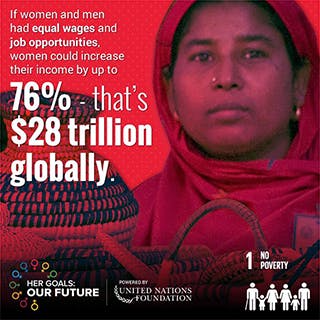
The adoption last year of the Sustainable Development Goals has created new momentum around the value and importance of empowering girls and women to ensure their rights and to drive sustainable development.
This is especially true with the first goal, “End Poverty In All Its Forms Everywhere.” Many girls and women face barriers to economic security, ranging from lack of access to financial services to carrying the burden of unpaid household labor. Yet when girls and women are empowered, they are powerful agents of change, helping to break the cycle of poverty for their families and communities.
Here are three areas, among many, where the UN Foundation is working to help enable all girls and women to have the opportunity to move from poverty to prosperity.
Making sure girls and women count: Civil registration and vital statistics (CRVS), the mandatory and universal recording of vital events such as live births, deaths, and marriage and divorce, plays a critical role in ending poverty. CRVS systems can help women access financial services and education, realize their right to inheritance if their spouse dies, and lead to a fair division of assets in the event of divorce. These are just some of the reasons why Data2X has been consistently vocal about the importance of CRVS. The past few months have been especially active: Data2X joined an event on the sidelines of the High-Level Political Forum on Sustainable Development and has launched several reports about the challenges of CRVS, which can be viewed here.
Focusing on the needs and rights of girls: Investing in adolescent girls is one of the most impactful ways to tackle poverty. When adolescent girls are empowered, educated, and healthy, they are able to pursue their dreams, earn higher wages, and have healthier families. Despite the increased inclusion of women in the formal economy, they are still vastly underrepresented in the top levels of many organizations, where most influential decisions are made. Organizations like GenHERation – an interactive media company that seeks to provide young women with access to career opportunities, female executives, skill-building activities, and scholarships – are seeking to close this gender gap. In July, GenHERation brought high school and college students to the UN Foundation to pitch innovative ideas to empower women. Additionally, the UN Foundation’s Girl Up campaign brought hundreds of adolescent girls to Washington, D.C. for a leadership summit in July to help them learn skills and advocate for girls around the world.
Strengthening women’s health: Ensuring access to reproductive health and rights for girls and women is critical in order to allow them to choose when, whether, and how many children to have. From pursing an education, to expanding economic opportunities, to providing for their children, family planning empowers girls and women to plan their lives. Worldwide, 225 million girls and women want to delay their next pregnancy but aren’t using modern contraceptives. In an effort to share the voices and stories of girls and women around the globe, the Universal Access Project has traveled around the world collecting first person stories of girls and women about their lives and why access to reproductive health and rights matters to them.
UN Foundation intern Mallary Taylor contributed to this post.

